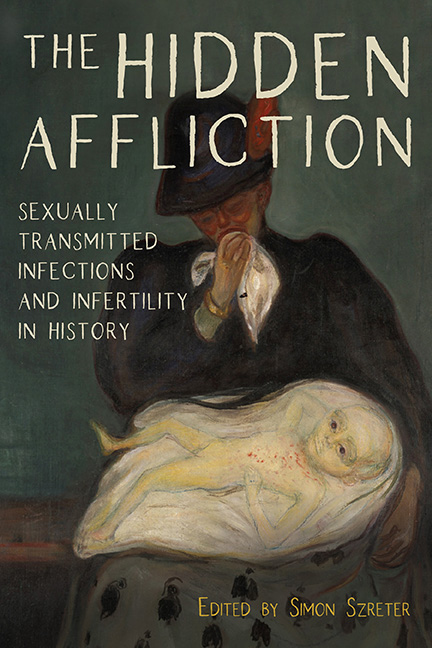Book contents
- Frontmatter
- Contents
- Acknowledgments
- Introduction
- Part One The Hidden Pitfalls in the Early Documentary Record
- Part Two The Biomedical Sciences and the History of the STI Microorganisms
- Part Three Population Decline in the Global South
- 6 Population Decline in Island Melanesia: Aphrodisian Cultural Practices, Sexually Transmitted Infections, and Low Fertility
- 7 Community Infertility in Papua New Guinea: Uncovering the Role of Gonorrhea
- 8 Fertility, STIs, and Sexual Behavior in Early and Mid-Twentieth-Century East Africa
- 9 “A Wise Provision of Nature for the Prevention of Too Many Children”: Evidence from the Australian Colonies
- Part Four Infertility and the Specter of Venereal Diseases in Modern Europe
- List of Contributors
- Index
9 - “A Wise Provision of Nature for the Prevention of Too Many Children”: Evidence from the Australian Colonies
from Part Three - Population Decline in the Global South
Published online by Cambridge University Press: 25 March 2020
- Frontmatter
- Contents
- Acknowledgments
- Introduction
- Part One The Hidden Pitfalls in the Early Documentary Record
- Part Two The Biomedical Sciences and the History of the STI Microorganisms
- Part Three Population Decline in the Global South
- 6 Population Decline in Island Melanesia: Aphrodisian Cultural Practices, Sexually Transmitted Infections, and Low Fertility
- 7 Community Infertility in Papua New Guinea: Uncovering the Role of Gonorrhea
- 8 Fertility, STIs, and Sexual Behavior in Early and Mid-Twentieth-Century East Africa
- 9 “A Wise Provision of Nature for the Prevention of Too Many Children”: Evidence from the Australian Colonies
- Part Four Infertility and the Specter of Venereal Diseases in Modern Europe
- List of Contributors
- Index
Summary
Doctors, scholars, politicians, and moralists have always had much to say about venereal disease, as have feminist historians and historians of eugenics and medical discourse. But rarely do we hear the voices of the afflicted, nor engage with the lived reality of the penalties of sex. Yet the relevant evidence can be found in medical records or reconstructed from population data to enable us to focus on the experiences endured by the afflicted and those rendered infertile. While the history of elite discourses matter, we need to know more about who, where, and why men and women became sick from sex and what it did to their lives. In this chapter we explore the lives from four marginalized populations in early colonial Australia: the family Furlong over four generations, convict women transported to Tasmania, Aboriginal women in Victoria, and women admitted to the charity Melbourne Women's Hospital.
A Family History
On November 7, 1883, the resident medical officer in the infirmary of the Melbourne Women's Hospital made his clinical observations of Maria Furlong (nee Robinson). She was thirty-four years old and had married fifteen years before, at the age of nineteen. The resident medical officer was delicate about Maria's condition, heading the page with the diagnosis of pregnancy and umbilical hernia, lest the prying eyes of the ladies of the hospital Committee of Management raise awkward questions. Hence, her face bore “stigmata,” but he did not specify of what nature. She now was “very flabby,” even though she was “fairly healthy” and had a “good sanguine complexion.” She was experiencing a difficult pregnancy with pains in her back between the shoulders. She had been vomiting for seven days and on admission was “very weak, with a feeble pulse, breathing fast and oppressed.” Four days later she miscarried a six-month-old fetus that had been “some time dead.” By November 24, thirteen days after the miscarriage, she was discharged with the hernia “very much less tense—lying loosely outside.” She was advised “to avoid hard food and strong drink.”
- Type
- Chapter
- Information
- The Hidden AfflictionSexually Transmitted Infections and Infertility in History, pp. 279 - 302Publisher: Boydell & BrewerPrint publication year: 2019

